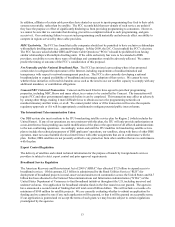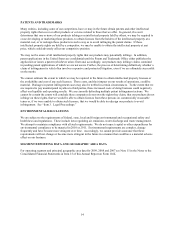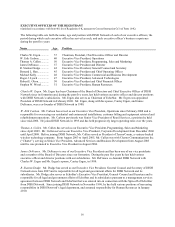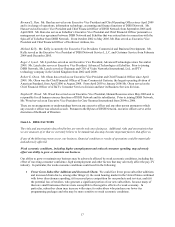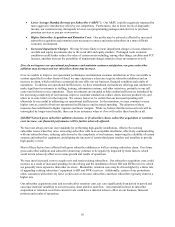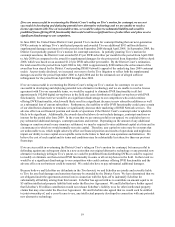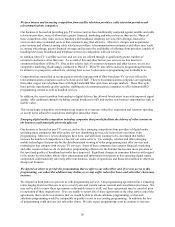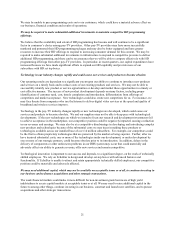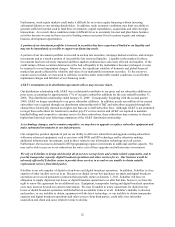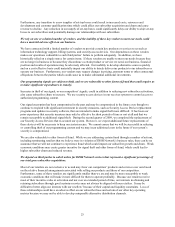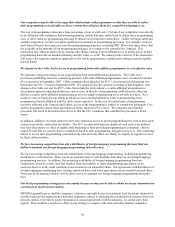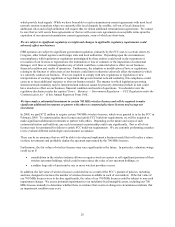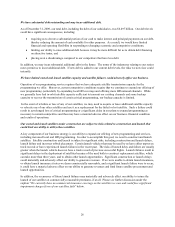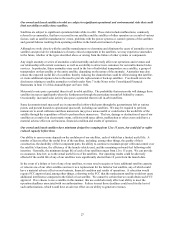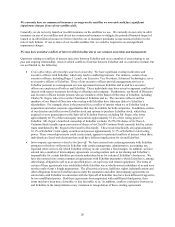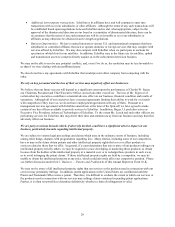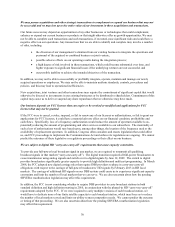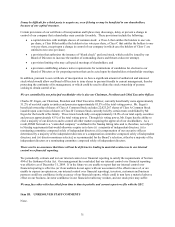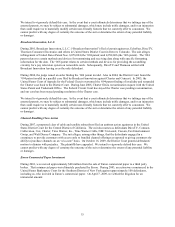Dish Network 2009 Annual Report Download - page 33
Download and view the complete annual report
Please find page 33 of the 2009 Dish Network annual report below. You can navigate through the pages in the report by either clicking on the pages listed below, or by using the keyword search tool below to find specific information within the annual report.
23
Furthermore, any transition to a new supplier of set-top boxes could result in increased costs, resources and
development and customer qualification time which could affect our subscriber acquisition and churn and cause
revenue to decline. Any reduction in our supply of set-top boxes could significantly delay our ability to ship set-top
boxes to our subscribers and potentially damage our relationships with our subscribers.
We rely on one or a limited number of vendors, and the inability of these key vendors to meet our needs could
have a material adverse effect on our business.
We have contracted with a limited number of vendors to provide certain key products or services to us such as
information technology support, billing systems, and security access devices. Our dependence on these vendors
makes our operations vulnerable to such third parties’ failure to perform adequately. In addition, we have
historically relied on a single source for certain items. If these vendors are unable to meet our needs because they
are no longer in business or because they discontinue a certain product or service we need, our business, financial
position and results of operations may be adversely affected. Our inability to develop alternative sources quickly
and on a cost-effective basis could materially impair our ability to timely deliver our products to our subscribers or
operate our business. Furthermore, our vendors may request changes in pricing, payment terms or other contractual
obligations between the parties which could cause us to make substantial additional investments.
Our programming signals are subject to theft, and we are vulnerable to other forms of fraud that could require us
to make significant expenditures to remedy.
Increases in theft of our signal, or our competitors’ signals, could in addition to reducing new subscriber activations,
also cause subscriber churn to increase. We use security access devices in our receiver systems to control access to
authorized programming content.
Our signal encryption has been compromised in the past and may be compromised in the future even though we
continue to respond with significant investment in security measures, such as Security Access Device replacement
programs and updates in security software, that are intended to make signal theft more difficult. It has been our
prior experience that security measures may only be effective for short periods of time or not at all and that we
remain susceptible to additional signal theft. During the second quarter of 2009, we completed the replacement of
our Security Access Devices that re-secured our system. However, we expect additional future replacements of
these devices will be necessary to keep our system secure. We cannot ensure that we will be successful in reducing
or controlling theft of our programming content and we may incur additional costs in the future if our system’s
security is compromised.
We are also vulnerable to other forms of fraud. While we are addressing certain fraud through a number of actions,
including terminating retailers that we believe were in violation of DISH Network’s business rules, there can be no
assurance that we will not continue to experience fraud which could impact our subscriber growth and churn. Weak
economic conditions may create greater incentive for signal theft and other forms of fraud, which could lead to
higher subscriber churn and reduced revenue.
We depend on third parties to solicit orders for DISH Network services that represent a significant percentage of
our total gross subscriber acquisitions.
Most of our retailers are not exclusive to us and may favor our competitors’ products and services over ours based
on the relative financial arrangements associated with selling our products and those of our competitors.
Furthermore, some of these retailers are significantly smaller than we are and may be more susceptible to weak
economic conditions that will make it more difficult for them to operate profitably. Because our retailers receive
most of their incentive value at activation and not over an extended period of time, our interests in obtaining and
retaining subscribers through good customer service may not always be aligned with our retailers. It may be
difficult to better align our interests with our resellers’ because of their capital and liquidity constraints. Loss of
these relationships could have an adverse effect on our subscriber base and certain of our other key operating
metrics because we may not be able to develop comparable alternative distribution channels.


